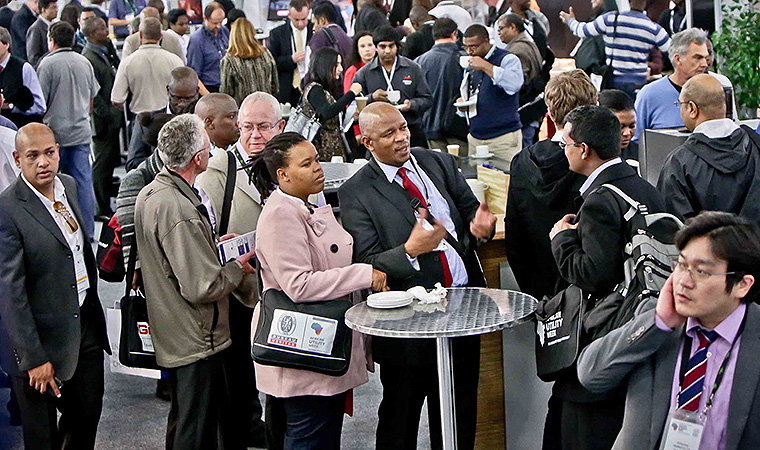
Rosatom to enhance partnership with South African
back to contentsThousands of energy experts from over 50 countries meet at the African Utility Week every year. In 2013, the conference welcomed over 5,000 visitors and over 300 exhibitors.
The African Utility Week offers producers and service providers the best markets for their products and services. It gives direct access to business development opportunities by inviting governments, industry regulators, generators, distributors and end consumers to discuss the industry’s future.
“We at Rosatom are happy to see African countries striving to improve their power systems for the sake of further economic development of the continent,” said Alexander Kirillov, Rosatom Africa Director, at a dedicated nuclear panel discussion.
The panel discussion involved top managers of South African and Kenyan nuclear companies and was moderated by Greg Kaser, Senior Project Manager at World Nuclear Association (UK).
“Africa is the last booming economy, and it is currently the fastest growing economy in the world, with a regional growth of 5.7% per annum,” stated Mr. Kirillov. “But as with any growing economy, Africa is not without its problems and is currently facing a number of grave challenges, with the largest one being a reliable source of electricity.” According to the World Bank, 25 of 54 African nations are currently in the midst of energy crisis. Only a quarter of the South African population has access to electricity. “Energy industry development lags behind the rising demand for electricity. It is unacceptable when 600 million people living in the modern world have limited or no access to a reliable supply of electricity,” explained Alexander Kirillov.
Recent estimates by Efficient Group claim that power shortage cost South Africa USD 24.7 billion over the past seven years. “This is roughly an amount needed to build four NPP units,” said Mr. Kirillov. According to Efficient Group, power shortages resulted in a 10% reduction of the economy growth rate from 2007 to 2014, with loss of over 1 million of job opportunities.
The Rosatom’s representative noted that further growth of Africa’s economy will require a reliable and affordable base-load power source that will stimulate industry and economic activity. “Nuclear power is an efficient, safe, environmentally friendly and affordable way of generating base-load power,” added Mr. Kirillov. “It is certainly not the only option for Africa but our experience in other countries without access to sufficient water or natural gas resources shows that nuclear stations are definitely a solution to the energy crisis.”
Director of Rosatom Africa emphasized the strategic importance of Nigeria’s decision to construct a 4.8 GW power station by 2030 and welcomed Kenya’s ambition to develop nuclear power. He reminded about other benefits that nuclear power will bring to other industries. A good example is the growing market of nuclear technologies (primarily in the field of medicine), which is expected to reach USD 24 billion by 2020. South Africa is by now the world’s second largest exporter of isotopes. Another example is application of nuclear technologies in agriculture, including desinsection and seed treatment to achieve higher yield. Desalination plants are another innovation capable of producing up to 170,000 cub m of fresh water per day.
Further to the need of nuclear industry development in Africa, the panel discussed the role of the African Union and the New Partnership for Africa’s Development (NEPAD) in promoting low-carbon and nuclear power and sharing nuclear competencies, prospects of uranium mining, environmental and radiation safety, use of low-power reactors, and awareness promotion among local communities.
Rosatom plans to enhance partnership with South African companies to establish a local world-class nuclear cluster offering a full range of products and services – from the front end of the nuclear fuel cycle to the power design and engineering.
At the IAEA General Conference in autumn 2014, Russia and South Africa made an agreement on strategic partnership in the nuclear power industry. The agreement provides for an opportunity to build Russian-designed nuclear power plants in South Africa. Apart from NPP construction, the two countries will cooperate in other nuclear fields, including nuclear research, South African infrastructure development and staff training.
Rosatom CEO Sergei Kirienko noted at the signing ceremony that the partnership would require an extensive involvement of local contractors in the manufacturing of NPP equipment and become a platform for joint projects in third countries. Furthermore, the partnership will create thousands of new jobs and provide local companies with up to USD 10 billion in new contracts.




